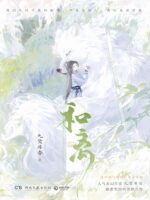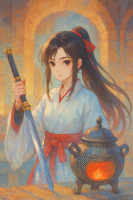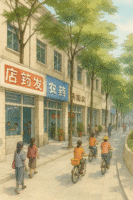Farm System C71
by MarineTLChapter 71
“It’s only the tenth, and it’s already this hot…”
As Gao Shen made his way back across the ocean, in the rice fields three li south of Guihua Township in Sichuan Province, Wang Dashun and his wife were struggling to get out of their vehicle.
It was three in the afternoon. Wang Dashun was holding an iron hoe and a winnowing basket, while his wife carried half a sack of seeds. Even though they both wore straw hats, the sun was so intense it felt like they could suffer heatstroke at any moment.
Five minutes later, they arrived at their own farmland.
Sichuan Province’s main food crops are rice and wheat, with economic crops like orchards, mulberry groves, and tea plantations. In March 3027, the province launched a farming support initiative aimed at guiding mountain communities to industrialize economic crops like mulberries, lemons, and tea based on local conditions.
The policy was meant to improve underdeveloped mountain areas. Just as locals were beginning to place their hopes in it, the Harma Storm swept through Zhongnan, devastating 80% of Sichuan’s economic crops. The province’s mulberry groves, lemon orchards, and tea plantations were wiped out. Some plantations held on for half a year before finally conceding defeat—there was no saving them.
Now, the entire country was promoting Acid Rain-resistant rice seeds. The plantations that had tried to hold out were switching from economic crops to rice. Sichuan, along with Jiangsu, Zhejiang, and Anhui, had become the provinces with the highest pre-orders for the new rice variety.
Wang Dashun’s family owned five mu of rice fields. To the south was a 2,000-mu lemon orchard. In past Aprils, the orchard would be bustling with harvest activity. This year, it was just as busy—but instead of picking fruit, workers were cutting down trees. The sound of chopping echoed from the direction of the orchard.
His wife, gossiping a bit, said, “I heard all 7,200 trees died.”
The lemon orchard was a local investment by villagers. The first two years were spent planting and nurturing the trees. They had just started turning a profit when the Harma Storm hit. She’d seen the owner a couple of days ago—he was only forty-three, but half his hair had gone white…
“No one’s having an easy time,” Wang Dashun said with a sigh.
After resting for a bit, the two rolled up their pants and began turning the soil.
“Starting this early?”
“Pingyu County made the news. We missed the first wave.”
…
It was three in the afternoon, and quite a few villagers passed by, chatting as they went. Wang Dashun worked the field skillfully while making small talk.
By 3:20, the sun overhead was blazing even hotter.
“Have some water,” his wife said, unscrewing the cap of a clear plastic bottle. With Acid Rain now a global issue, TV programs constantly reminded people to be cautious about drinking water. Their home was at the foot of the mountain, and the water recycling systems were outdated, so they had to go to the town’s water plant every week to fetch clean water.
Wang Dashun unscrewed the cap and gulped down a big mouthful. In the past, when he worked the fields, he’d pour out leftover water to irrigate the soil. But with purified water now in short supply, water conservation had once again become a national priority.
Over the next two hours, Wang Dashun and his wife worked diligently. By 5 p.m., as the sun began to set, the worst of the heat finally passed.
Wang Dashun was counting the remaining seeds when a middle-aged man came down from the hill behind them. He carried a burlap sack and held a homemade spear in his left hand.
“Out working the fields, huh?” the man greeted the farmers in the rice paddies.
The villagers gave him forced, polite smiles. “Just planting a bit.”
The man was Zhao Erxing, a well-known troublemaker in the village. Ever since the torrential rains in Zhongnan, he’d been sneaking around stealing chickens and petty items from people’s homes. At the end of last year, he even killed and ate a neighbor’s guard dog—a nine-year-old mutt. Because of his behavior, the villagers had turned him in to the local police station. He spent two weeks in detention. After that, he stopped stealing and started hunting wild game in the mountains instead.
Zhao Erxing mostly hunted wild rabbits and porcupines. With the forests rapidly shrinking, he managed to make a decent profit from the animals he caught. If it were just rabbits and porcupines, the villagers might have turned a blind eye. But there were rumors that he also collected animal carcasses to sell at the market.
These carcasses were salted, chopped up, and sold to loosely regulated food markets. The whole thing was more than just disgusting—it was potentially dangerous. Some civic-minded villagers had anonymously reported him.
After an investigation, no illegal animal remains were found in Zhao Erxing’s home. Lacking evidence, the authorities could only issue repeated verbal warnings.
Seeing that the villagers didn’t want to talk to him, Zhao Erxing didn’t push it. He made a round and walked over to Wang Dashun’s field. “Hey, Brother Wang.”
Zhao Erxing was the son of Wang Dashun’s maternal aunt—they were first cousins.
“You just got out. Don’t go doing anything shady again,” Wang Dashun said with a complicated expression.
“I’m a law-abiding citizen now!” Zhao Erxing declared dramatically as he opened the sack.
Inside were two wild pheasants and a scrawny wild rabbit—all dead. A fresh pool of blood had soaked into the bottom of the bag.
“My aunt’s sixty-nine. Don’t make her worry,” Wang Dashun said, closing his eyes, unable to look.
“Spineless,” Zhao Erxing chuckled at Wang Dashun’s reaction. He found it amusing, but deep down, he looked down on his cousin, always thinking Wang Dashun was too timid and indecisive.
After a brief chat, Zhao Erxing slung the sack over his shoulder and left.
His wife watched Zhao Erxing’s retreating figure. “You really believe him?”
Wang Dashun sighed. “Believe it or not, there’s nothing I can do.”
After the global Acid Rain crisis, Longxia had implemented strict food safety regulations: only quarantined fresh meat could enter the market. Animals exposed to Acid Rain often carried harmful residues. The regulations weren’t just to reduce animal-related risks—they were also to ensure public health.
The government enforced food safety laws rigorously. But where there’s policy, there’s always a workaround. Some villagers still took the risk of illegally selling wild game. Longxia had cracked down on many offenders, but the profits from wild meat were so high that an entire shadow industry had emerged.
Hunting wild animals wasn’t illegal. What worried Wang Dashun was that Zhao Erxing might be selling animal carcasses for profit. These animals often died long before being found, their bodies riddled with parasites and Acid Rain contaminants. If that kind of meat made it into the market… it would pose a serious health threat to the public.
At 7 p.m., the couple ate some steamed buns with pickled vegetables, then went back to planting.
This April was hotter than usual. Not just them—other villagers were also taking advantage of the cooler evening hours to get their work done.
…
“Caught two pheasants and a rabbit.”
While Wang Dashun continued working into the night, Zhao Erxing made his way through a winding path to a village house ten li south, in Gaoyu River Village. It was an ordinary southern-style village home, tucked away in a secluded spot. Two red garments hung at the door.
As Zhao Erxing stepped inside, a woman in her forties wearing black stockings asked, “So late?”
Zhao Erxing dropped the sack onto the table. “Not many animals in the mountains these days. Pheasants and rabbits are hard to catch.”
The woman opened the sack and handed it to a tattooed man in his thirties, who began plucking feathers and weighing the animals with practiced ease.
While the man worked, Zhao Erxing looked around. It was a simple country home with a square table, a sofa, and a large bed. The furnishings were basic, but against the wall were stacks of black plastic bags, each leaking blood and giving off a strong, pungent odor.
After a moment, the man finished weighing. “Twelve jin of pheasant, six jin of rabbit.”
“Same price as before?”
“Yeah.”
This was an unlicensed Wild Game Workshop. The going rate was thirty-five per jin for pheasant, sixty for rabbit. Zhao Erxing checked the scale, and the woman handed him 780 yuan in cash.
“Thanks, Sister Liu,” Zhao Erxing said.
The woman, Liu Xia, was the owner of the Wild Game Workshop. He’d stumbled upon the place by accident. It was well-hidden and mainly bought wild game from nearby hunters, which was then transported elsewhere for processing. Zhao Erxing had only been working with them for two months, but he had a gut feeling—there was someone bigger behind this operation…
As he mulled it over, Liu Xia asked, “Still not interested in the other business?”
“They’re cracking down hard,” Zhao Erxing replied, hesitating.
Liu Xia was talking about the corpse trade. With vegetation dying off, many wild rabbits and boars were perishing in the forests. The soil, damaged by Acid Rain, had lost its ability to decompose organic matter. These carcasses were often covered in insects and could go two months without breaking down.
With the meat supply chain in crisis, some unscrupulous traders had set their sights on these carcasses. They’d collect the bodies, process them into spiced meat or dumpling fillings, and funnel them into unregulated markets through special channels.
He had originally planned to get into the corpse scavenging business, but a mistaken report by a villager got him caught before he could commit the crime. Now that he’s been arrested, at most he’ll get a year. But if he’d gone into the animal carcass trade, it wouldn’t have been just a year…
“You should really think it through,” Liu Xia said, not pushing further, just laying out the profit potential of scavenging corpses.
As Liu Xia spoke, Zhao Erxing watched the tattooed man bag up wild pheasants and rabbits, then toss them skillfully onto a pile of plastic. These were all Acid Rain animals. The conditions here were terrible—he could see all sorts of unidentified bugs crawling over the bags.
Zhao Erxing felt a wave of nausea rise in his stomach. He had only one thought: thank god I’m not the one eating that.
…
At the same time Zhao Erxing was leaving in disgust, over at Sichuan Province First Hospital, a middle-aged man lay on the operating table, his face twisted in pain. Around him, the surgical team worked with focused precision. They administered anesthesia, then opened up his stomach to begin the procedure…
Ten minutes later, the lead surgeon stepped out of the operating room.
“How is he?” The patient’s family, eyes red from crying, rushed up.
“Acute gastric perforation. We can’t rule out bacterial infection.”
“Can he be saved?”
“He’s not out of danger yet.”
After calming the family down, the middle-aged doctor headed into a consultation room.
Inside sat three plainclothes officers in shirtsleeves. The doctor, fully disinfected, sighed as he handed over the medical file. “Seventh case.”
The file detailed the patient’s condition. Under the section for food consumed before illness, it read: “Large quantity of wild porcupine meat.”
With the Acid Rain crisis ongoing, Longxia authorities had repeatedly stressed: no consumption of untested Acid Rain animals. Some residents were careful, others negligent.
Since the beginning of the month, food-related illnesses had been on the rise across the provinces. The Longxia Epidemic Prevention Bureau had already issued a nationwide alert. According to health officials, the surge in infections likely correlated with the rising temperatures in April.
The infections weren’t contagious, but the sudden outbreak had prompted every province to form special investigative teams to crack down hard on illegal consumption—both among residents and at the source.
This team was part of the food investigation task force, focused on uncovering the province’s gray-market supply chains.
![Cannon Fodder Refuses to Be a Stepping Stone for His Cub [QT] Cover](https://marinetl.xyz/wp-content/uploads/2025/06/228114s_x16_drawing-143x200.png)









0 Comments